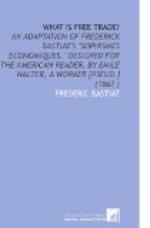The RAW-MATERIALIST: “It is true, that in regard to wool, you may be right. But a bag of wheat, an ingot of iron, a quintal of coal—are they the produce of labor? Did not Nature create them?”
The PROTECTIONIST: “Without doubt Nature creates the elements of all things; but it is labor which produces their value. I was wrong myself in saying that labor creates material objects, and this faulty phrase has led the way to many other errors. It does not belong to man, either manufacturer or cultivator, to create, to make something out of nothing; if, by production, we understand creation, all our labors will be unproductive; that of merchants more so than any other, except, perhaps, that of law-makers. The farmer has no claim to have created wheat, but he may claim to have created its value: he has transformed into wheat substances which in no wise resembled it, by his own labor with that of his ploughmen and reapers. What more does the miller effect who converts it into flour, the baker who turns it into bread? Because man must clothe himself in cloth, a host of operations is necessary. Before the intervention of any human labor, the true raw materials of this product (cloth) are air, water, gas, light, the chemical substances which must enter into its composition. These are truly the raw materials which are untouched by human labor; therefore, they are of no value, and I do not think of protecting them. But a first labor converts these substances into hay, straw, etc., a second into wool, a third into thread, a fourth into cloth, a fifth into clothing—who will dare to say that every step in this work is not labor, from the first stroke of the plough, which begins, to the last stroke of the needle, which terminates it? And because, in order to secure more celerity and perfection in the accomplishment of a definite work, such as a garment, the labors are divided among several classes of industry, you wish, by an arbitrary distinction, that the order of succession of these labors should be the only reason for their importance; so much so that the first shall not deserve even the name of labor, and that the last work pre-eminently, shall alone be worthy of the favors of protection!”
The RAW-MATERIALIST: “Yes, we begin to see that wheat no more than wool is entirely devoid of human labor; but, at least, the agriculturist has not, like the manufacturer, done all by himself and his workmen; Nature aids him, and if there is labor, it is not all labor in the wheat.”
The PROTECTIONIST: “But all its value is in the labor it has cost. I admit that Nature has assisted in the material formation of wheat. I admit even that it may be exclusively her work; but confess that I have controlled it by my labor; and when I sell you some wheat, observe this well: that it is not the work of Nature for which I make you pay, but my own; and, on your supposition, manufactured articles would be no more the product of labor than agricultural ones. Does not the manufacturer, too, rely upon Nature to second him? Does he not avail himself of the weight of the atmosphere in aid of the steam-engine, as I avail myself of its humidity in aid of the plough? Did he create the laws of gravitation, of correlation of forces, of affinities?”




